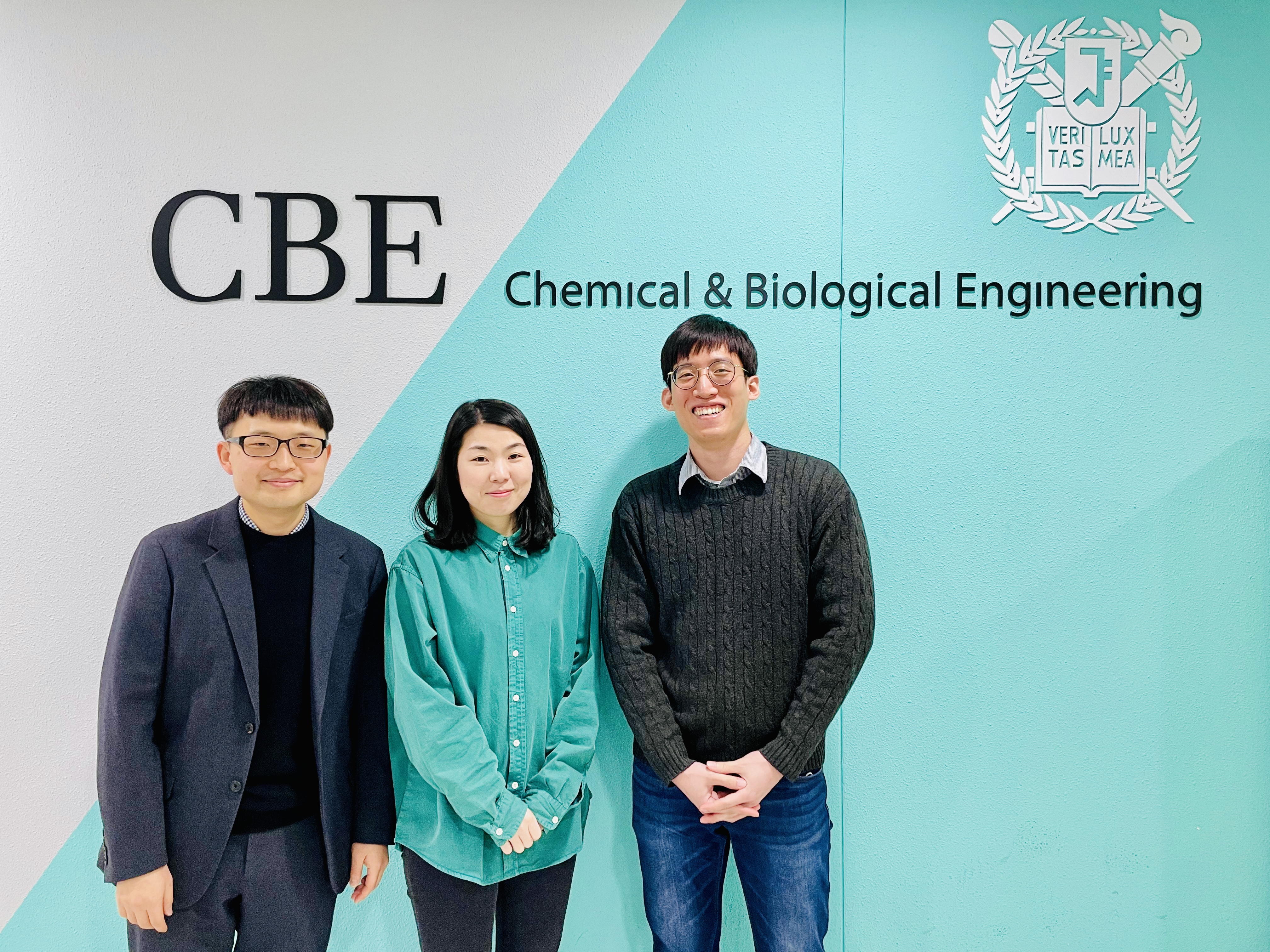loaction
공대뉴스광장
SNU College of Engineering Professor Sang Woo Seo's Team Develops a Microbial-based Protein High-quality Production System that will Enable ‘Carbon Neutrality’
-
작성자
관리자
-
등록일
2021.03.15
-
조회수
782
SNU College of Engineering Professor Sang Woo Seo's Team Develops a Microbial-based Protein High-quality Production System that will Enable ‘Carbon Neutrality’
-Expected to dramatically improve efficiency and source technology applied to the production of bio-compounds, industrial enzymes, and pharmaceuticals
-Published online in the world-renowned journal “Nature Chemical Biology” on February 5

▲ (From left) Professor Sang Woo Seo of the Department of Chemical and Biological Engineering, Dr. Jina Yang and Ph.D. student Yong Hee Han
-Published online in the world-renowned journal “Nature Chemical Biology” on February 5

▲ (From left) Professor Sang Woo Seo of the Department of Chemical and Biological Engineering, Dr. Jina Yang and Ph.D. student Yong Hee Han
Seoul National University College of Engineering (Dean Kookheon Char) revealed on February 5 that Professor Sang Woo Seo's team of the Department of Chemical and Biological Engineering developed an original technology for designing a gene expression system for high-quality microbial protein production that can be applied to significantly improve the efficiency of biorefinery, from biopharmaceuticals to industrial enzyme production and carbon-neutral biorefinery.
Recombinant proteins are used in various industrial fields, from biopharmaceuticals such as insulin to industrial proteins such as laundry detergents. Because proteins can perform their functions only when they are of the perfect length and structure, recombinant proteins synthesized in microorganisms are used after several steps of purification. Until now, as a method of increasing the yield of the production process, strain improvement techniques have been developed to increase the expression level of the target protein or to supplement the insufficient amino acids in cells.
However, in the gene expression system of microorganisms in which 'transcription' and 'translation' occur at the same time, if a problem occurs in the transcription process, it is translated as it is to synthesize an incomplete protein. Therefore, when the expression level in increased by engineering of the promoter (transcription efficiency) and 5'UTR (untranslated region) the amount of incomplete protein synthesized from the damaged template (mRNA) also increases.
The Protein Quality Control System (ProQC) newly developed by Professor Sang Woo Seo's team is a high-quality protein production system that allows only intact mRNA to be used as a template by understanding the existing expression system and redesigning newly discovered biological components. In eukaryotic cells, translation is initiated from mRNA that has been transcribed, and by mimicking this, trigger RNA is expressed in an improved form of the Toehold switch (an improved state of the trans-activating RNA where the trigger RNA is expressed, initiating translation by releasing RNA structures through a complementary bond with the 5' terminal end) so that the 3'end regulates the initiation of translation in microorganisms.
In the redesigned expression system, only when the transcription process is over, the cis-trigger at the 3'end is exposed, and this cis-trigger releases the structure (that is inhibiting translation initiation) at the 5'end of the same mRNA, and protein synthesis begins. At this point, the mRNA becomes circular in a state in which a part of the 5'end sequence and a part of the 3'end sequence are bound.
By applying the ProQC system, a new gene expression system, to various proteins, the microorganisms that applied the developed DNA cassette synthesized 150% to 250% more proteins of intact length, and an improvement was clearly observed as more incomplete proteins were synthesized in the natural expression system.
In order to confirm the practicality of the ProQC system, the researchers introduced it into the biosynthetic pathway of various metabolites, and confirmed that the productivity of metabolites increased by more than two times in the microorganisms applying the ProQC system compared to the existing system even though only the expression cassette of the target protein was changed.
“The gene expression system developed in this study allows microorganisms to selectively synthesize only high-quality proteins on their own, and because it is a new technology that adds one step further into the existing recombinant protein production strategy, the economic feasibility and efficiency of the biocompound production process for carbon neutrality and recombinant proteins including bio-medicine based on microbial cell factories, industrial enzymes, etc. shall be drastically improved," said Professor Sang Woo Seo.
The research results were published online on February 5, in 'Nature Chemical Biology,' the world's most prestigious scientific journal. This research achievement was carried out with support from the Korea Research Foundation's Bio-Medical Technology Development Korea Bio Grand Challenge project, C1 gas refinery project, and the basic laboratory support project
.[Information about the Research Paper and the Authors]
Title of the Research Paper: Synthetic protein quality control to enhance full-length translation in bacteria
Publisher: Nature Chemical Biology (2021)
DOI: 10.1038/s41589-021-00736-3
URL: https://www.nature.com/articles/s41589-021-00736-3
First Author: Jina Yang (Seoul National University Researcher), Yong Hee Han (Seoul National University Ph.D. Program)
Corresponding Author: Sang Woo Seo (Seoul National University, Department of Chemical and Biological Engineering)
담당부서대외협력실
전화번호880-9148